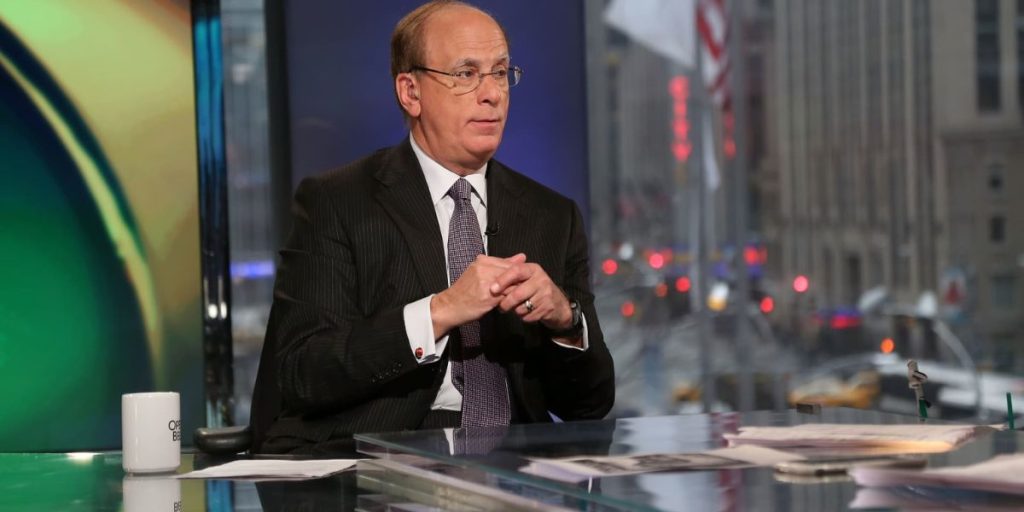According to BlackRock CEO Larry Fink’s annual shareholder letter, the nation’s changing demographics are “putting the U.S. retirement system under immense strain,” as Americans live longer and spend more years in retirement.
One solution, he thinks, is for Americans to work longer before retiring.
“Nobody should be forced to work longer than they want to. But I do think it’s a little strange that our core idea for the appropriate retirement age — 65 years old — comes from the Ottoman Empire,” Fink wrote in his 2024 letter, which focuses primarily on the retirement dilemma confronting the United States and other countries as their populations age.
Fink’s proposals for solving the nation’s retirement dilemma come amid a discussion over the future of Social Security, which will face a budget shortage in less than a decade. Some Republican senators, including Fink, have supported raising the retirement age for receiving Social Security benefits, stating that because Americans are living longer lives, they should also work longer.
However, this ignores the reality of aging in the workplace, with the AARP reporting in a 2022 survey that the majority of people over 50 experience ageism at work. Many older Americans stop working earlier than expected due to illness or an unexpected job loss. In fact, the typical age of retirement in the United States is 62, which is lower than the “traditional” retirement age of 65.
Teresa Ghilarducci, a famous retirement specialist and New School of Research professor, told CBS MoneyWatch that Fink is correct that the retirement system isn’t functioning for most households. However, she believes his assessment that individuals should work longer hours is incorrect.
“After a 40-year-old experiment of a voluntary, do-it-yourself-based pension system, half of workers have no easy way to save for retirement,” she went on to say. “And in rich nations, why isn’t age 65 a good target for most workers to stop working for someone else?”
She continued, “Working additional hours will not get us out of this. Most people do not retire when they want to.
A vested interest?

To be sure, America’s retirement gap, or the disparity between what people need to fund their golden years and what they’ve actually saved, is nothing new, nor is Social Security’s impending financial crisis. Fink’s views are important because of his position as the head of the world’s largest asset manager, with over $10 trillion in assets, including many retirement accounts.
Of course, Fink has a great interest in Americans increasing their retirement funds, since his firm receives fees from those accounts. In his letter, he also praises BlackRock’s new target-date fund, LifePath Paycheck, which will launch in April.
“He’s steering the conversation toward BlackRock—and a lot of people who talk about Social Security reform on Wall Street want to privatize it in some way and make money,” Boston University economist Laurence Kotlikoff, an expert on Social Security, told CBS MoneyWatch.
To be sure, Fink recognizes public policy success stories in addressing retirement savings, such as Australia’s system, which began in the early 1990s and required companies to contribute a portion of a worker’s pay to a fund. He highlighted that Australia currently has the world’s 54th largest population yet the 4th largest retirement system.
“As a nation, we should do everything we can to make retirement investing more automatic for workers,” he said.
Can boomers solve the problem?
Fink, who was born in 1952, believes that his generation has a responsibility to help solve the country’s retirement issues. Financial uncertainty among younger Americans, such as millennials and Generation Z, is producing generations of disillusioned, worried workers, he said.
“They believe my generation, the baby boomers, have prioritized their own financial well-being at the expense of who comes after. And in the case of retirement, they are correct,” Fink stated.
He went on to say, “And before my generation fully disappears from positions of corporate and political leadership, we have an obligation to change that.”
Boomer (and older) policymakers and officials regularly disagree on how to address the retirement dilemma. However, failure to address the issue harms not only individual Americans’ retirements but also the country’s collective belief in the United States’ future, according to Fink.
“We risk becoming a country where people keep their money under the mattress and their dreams bottled up in their bedroom,” he said.